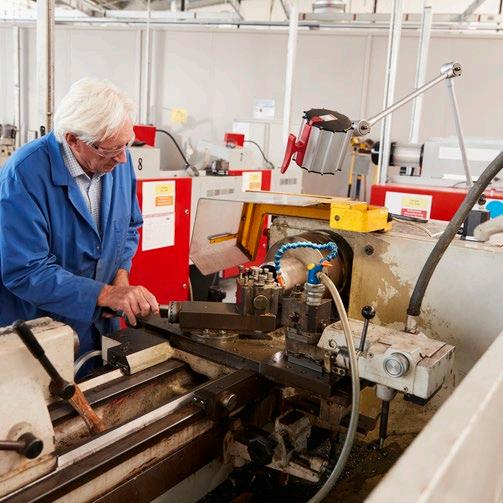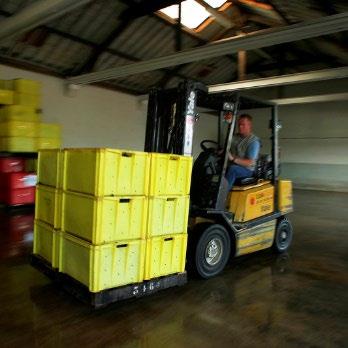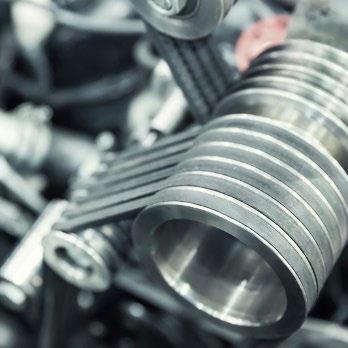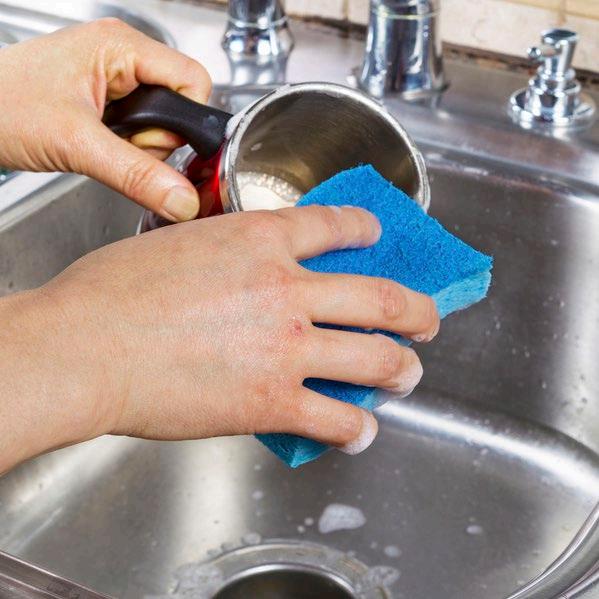

INDUSTRIAL MAINTENANCE: MAINTENANCE CHECKLIST


LESSON PLAN OVERVIEW
Career: Industrial machinery mechanics maintain and repair factory equipment and other industrial machinery such as conveyors (moves materials from one location to another), production machinery (produces a product), and packaging equipment (packages products for shipping).
Lesson: This lesson plan highlights some of the skills needed on a daily basis to maintain or keep things working. The focus will be on how routine tasks are important in some careers
Grade Level: Elementary Grades
Learning Objectives:
〉 Students will learn about some of the job tasks of an industrial maintenance mechanic such as how they schedule and perform routine equipment maintenance in a manufacturing plant.
〉 Students will identify equipment and machinery in an industrial plant that requires routine maintenance.
〉 Students will create a Chore Calendar to learn the importance of creating a routine checklist to help in maintaining equipment.
〉 Students will also have an opportunity to learn more about the industrial maintenance mechanic profession, including common job tasks, salary, career pathways, and the credentials needed to perform the job.
Materials Needed:

Activity #1: Machinery Maintenance
〉 Activity #1 Worksheet: Machinery Maintenance
Activity #2: My Chore Calendar
〉 Activity #2 Worksheet: My Chore Calendar

TEACHER GUIDE
Lesson Instructions: The following lesson plan will help you introduce students to the industrial maintenance mechanic career. Begin each lesson by reading the Class Message below to your students, then have them watch the recommended class video. Afterwards, facilitate a discussion with the Class Questions listed below.
After the discussion, students will complete two activities. Each activity has a printable worksheet with instructions and areas to record their work. Have students read their worksheets before beginning each activity.
You should also familiarize yourself with the student worksheets to assist them when needed and to help facilitate the discussion that ends then activity


Class Message: Today we are going to learn about industrial maintenance mechanics and what they do at work. Maintenance mechanics usually work in factories that have lots of equipment that makes all kinds of products. The maintenance mechanic’s job is to make sure that all of the equipment and machines in the plant keep working properly.
In this lesson, we will discuss and identify machines and other things that need to be taken care of on a regular basis. We will also develop a chore calendar to help us understand the importance of taking care of machines
Let’s watch this video about industrial maintenance mechanics and some of the things they do at work.


Industrial Machinery Mechanic Career Video (http://tn-caps.com/r/35VNM)

Class Discussion Questions:
〉 Have you ever heard the word maintenance before? What do you think maintenance means?
〉 Can you think of some things in your home or in our classroom that need maintenance?
〉 What would happen if the air conditioning or heat quit working at our school? Would we still have class? Who would the principal call to fix the problem?
〉 What would happen if a piece of equipment stopped working at a plant? Would it have to shut down? Who fixes equipment in a plant?
Activities Overview: This lesson plan includes two student activities. In Activity#1, students will learn about and identify items that require routine maintenance. In Activity #2, students will read a passage about doing chores at home and will create a Chore Calendar for ensuring household tasks are done on time, similar to the maintenance schedules mechanics use in plants.
Read and familiarize yourself with the student worksheet for each activity

Activity #1: Machinery Maintenance
Students will identify items on the worksheet that require routine maintenance. Students will then locate and identify mechanical items in the classroom or school that require routine maintenance.
Activity Instructions:
〉 Hand out the student worksheet for Activity #1 – Machinery Maintenance.
〉 Facilitate an introduction to the activity.
〉 Have students identify items in your school that require maintenance.
〉 After completion, facilitate a discussion of the suggested questions for this activity.
Activity Results: Students check all of the items that need routine maintenance and participated in a discussion of the activity.

〉 How many pictures did you mark? What made you decide which pictures to mark? Possible answer: ALL of the items fit the definition of “routine maintenance”
〉 How many of you marked the pencil sharpener or whiteboard? Why do you think these items need routine maintenance? The manual pencil sharpener is a machine – the gears need routine maintenance and the shavings need emptying. While the whiteboard is not a machine, it does require regular cleaning to prevent residue buildup
〉 What items did you find in your school that require maintenance? Air conditioner, copier, elevator, cafeteria equipment.
〉 What would happen if machines in a factory are not properly maintained? If machines are not maintained properly, they could fail, possibly injure a worker, or even cause the factory to shut down operations temporarily.
〉 How does an industrial maintenance mechanic know when to perform routine maintenance? Maintenance workers use schedules that tell them when and what needs to be done to each piece of equipment.


Activity #2: My Chore Calendar
Students will read the passage for the activity and write the activities in the appropriate place on a Chore Calendar. Students will then create their own home Chore Calendar to identify chores they do at home and when they need to be done
Activity Instructions:
〉 Hand out the student worksheet for Activity #2 – My Chore Calendar.
〉 Facilitate discussions of the suggested questions for the activity.
〉 Optionally, ask students to take home their own chore calendar and keep track of chores that they actually do for a week.
Activity Results: Students learned about the importance of scheduling regular tasks by creating a Chore Calendar for their own use at home.
Here is what Sam’s finished Chore Calendar should look like:
Sam’s Weekly Chore Calendar
Monday
Tuesday
Wednesday
Rinse dishes and put in the dishwasher
Make bed Pickup clothes
Clean cat litter box
Rinse dishes and put in the dishwasher
Make bed Pickup clothes
Take out trash put can at street for pickup
Bring trash can back to house
Rinse dishes and put in the dishwasher
Make bed Pickup clothes
Clean cat litter box
Thursday Rinse dishes and put in the dishwasher
Make bed Pickup clothes
Friday Rinse dishes and put in the dishwasher
Make bed Pickup clothes
Clean cat litter box
Saturday Rinse dishes and put in the dishwasher
Make bed Pickup clothes
Sunday Rinse dishes and put in the dishwasher
Make bed Pickup clothes

Activity Discussion:
〉 Do you think that creating a schedule or calendar makes maintenance easier?
〉 What type of maintenance or chores do you help with in your home?
〉 Do you think that working in maintenance would be a good career? Why or why not?


CAREER INSIGHT
Career Highlight: This lesson plan highlights some of the skills an industrial maintenance mechanic uses on a daily basis to maintain industrial equipment, tools, and machinery. See the Employers in My Area section to contact businesses and organizations in your area about classroom demonstrations, on-site visits, or other additional career exposure opportunities.
Featured Career:
Industrial Maintenance Mechanic
Career Descriptions: Industrial maintenance mechanics s maintain and repair factory equipment and other industrial machinery.
Industrial maintenance mechanics typically:

〉 Read technical manuals to understand equipment and controls
〉 Disassemble machinery and equipment when there is a problem
〉 Repair or replace broken or malfunctioning components
〉 Perform tests to make sure the machine is running smoothly
〉 Clean and lubricate equipment or machinery.
Other Names for this Career: Industrial Machinery Mechanic, Industrial Mechanic, Mechanic, Master Mechanic, Maintenance Technician, Maintenance Mechanic, Machine Adjuster, Fixer, Loom Fixer, Overhauler


STANDARDS ALIGNMENT
Activity #1: Machinery Maintenance
READING STANDARDS: Range of Reading and Level of Text Complexity
Make inferences in increasingly complex text and logically explain their thinking behind the inferences;
〉 Read and comprehend a variety of literary nonfiction at the high end of the grades 68 text complexity band independently and proficiently.
〉 Read and comprehend a variety of literary nonfiction throughout the grades 6-8 text complexity band proficiently, with a gradual release of scaffolding at the high end as needed.
〉 Read and comprehend a variety of literary nonfiction throughout the grades 6-8 text complexity band proficiently, with a gradual release of scaffolding at the high end as needed.
READING STANDARDS: Craft and Structure
〉 Determine the meaning of words and phrases as they are used in a text, including figurative, connotative, and technical meanings; analyze the impact of a specific word choice on meaning and tone, including analogies and allusions to other texts.
〉 Determine the meaning of words and phrases as they are used in a text, including figurative, connotative, and technical meanings; analyze the impact of specific word choices on meaning and tone, including allusions to other texts and repetition of words and phrases.
〉 Determine the meaning of words and phrases as they are used in a text, including figurative, connotative, and technical meanings.
Science and Engineering Practices
〉 Planning and carrying out controlled investigations to collect data that is used to test existing theories and explanations, revise and develop new theories and explanations, or assess the effectiveness, efficiency, and durability of designs under various conditions.
〉 Obtaining, evaluating, and communicating information from scientific texts in order to derive meaning, evaluate validity, and integrate information.

Activity #2: My Chore Calendar
WRITING STANDARDS: Research to Build and Present Knowledge
〉 Conduct research to answer a question (including a self-generated question), drawing on multiple sources and generating additional related, focused questions that allow for multiple avenues of exploration.
〉 Conduct research to answer a question, drawing on multiple sources and generating additional related, focused questions for further research and investigation
〉 Conduct research to answer a question, drawing on multiple sources and refocusing the inquiry when appropriate.
〉 Support interpretations, analyses, reflections, or research with evidence found in literature or informational texts, applying grade 8 standards for reading; assess whether the reasoning is sound and the evidence is relevant and sufficient to support the claims and recognize when irrelevant evidence is introduced
〉 Support interpretations, analyses, reflections, or research with evidence found in literature or informational texts, applying grade 7 standards for reading; assess whether the evidence is relevant and sufficient to support the claims.
〉 Support interpretations, analyses, reflections, or research with evidence found in literature or informational texts, applying grade 6 standards for reading.
Science and Engineering Practices
〉 Constructing explanations and designing solutions to explain phenomena or solve problems.
〉 Engaging in argument from evidence to identify strengths and weaknesses in a line of reasoning, to identify best explanations, to resolve problems, and to identify best solutions.
School Counseling Standards
〉 Develop and practice effective technology skills
〉 Demonstrate critical thinking and decision-making skills to make informed decisions
〉 Communicate effectively using oral, written, and listening communications skills


EDUCATOR RUBRIC
ITEM Does Not Meet Expectations
Sam’s Chores List Did not accurately create Sam’s Chore List
Meets Expectations Exceeds Expectations
Accurately created Sam’s chore list
Your Personal Chore or Responsibilities List
Personal chore list lacked detail. Student did not attempt to accurately capture their week of chores and/or responsibilities.
Week of Data Collection Student did not collect data on every day of the week. Student did not record multiple events, leaving out important data.
Personal chore list contained sufficient detail to capture a week of chores and/or responsibilities.
Student collected data for every day of the week and recorded multiple events when needed.
Accurately created Sam’s chore list. Work was neatly written without spelling mistakes.

Personal chore list contained excellent detail capturing a week of chores and/or responsibilities. Work was done neatly with extra attention to proper spelling and grammar.
Student collected data for every day of the week and recorded multiple events when needed. Their data collection was neat, organized and had evidence of effort to maintain proper spelling and grammar.

ACTIVITY #1: MACHINERY MAINTENANCE
Introduction: Most factories operate 24 hours a day and 7 days a week, so it is important to make sure all of the equipment in a factory is working properly. If a machine is not working properly, it could cause big problems. That’s why machinery maintenance workers perform routine maintenance. Routine maintenance is maintenance done on a regular schedule to clean, inspect, test, and repair machines to ensure they are working correctly.
Activity Description: Identify all of the items that require routine maintenance Then, look around your classroom to see if you can find other things that need routine maintenance.
Activity Procedure: Place a check mark in the box below the pictures for all of the things that need routine maintenance. Next, go around your school and find items that need regular maintenance. Make a list of these items and discuss in your class.


Activity Discussion:
〉 How many pictures did you mark? What made you decide which pictures to mark?
〉 How many of you marked the pencil sharpener or whiteboard? Why do you think these items need routine maintenance?
〉 What items did you find in your school that require maintenance?
〉 What would happen if machines in a factory are not properly maintained?
〉 How does an industrial maintenance mechanic know when to perform routine maintenance?












ACTIVITY #2: MY CHORE CALENDAR
Introduction: Industrial maintenance mechanics are workers who make sure that all the machines and equipment in a factory are in good working condition. They inspect and test equipment to make sure it is working correctly, lubricate machine parts, and replace or repair parts as needed. How do you think they know when to inspect and service equipment? They follow maintenance schedules.
Activity Description: In this activity, you will create two Chore Calendars, one for a boy named Sam and one that you can use for the chores you do in your own home.
Activity Procedure: Read the passage below and outline Sam’s chores in the chore calendar. After you finish, create a chore calendar for the chores you do at home.


Part 1 – Read the passage below and use it to help Sam create his Chore Calendar.
“Hi! My name is Sam, and I need your help outlining my home chores. I help out my family by doing chores around the house. Every day, I have to rinse my dishes and put them in the dishwasher. I also have to make my bed and pickup my clothes on a daily basis. On Tuesdays, I take out the trash and put the can at the street for pickup. When I get home from school, I bring the trash can back up to the house. On Monday, Wednesday, and Friday, I have to clean out the cat’s litter box. That’s not much fun but, I love my cat!”
Sam’s Weekly Chore Calendar

Great job! Now use the outline below to create your own home Chore Calendar.
My Personal Weekly Chore Calendar

Activity Discussion:
〉 Do you think that creating a schedule or calendar makes maintenance easier?
〉 What type of maintenance or chores do you help with in your home?
〉 Do you think that working in maintenance would be a good career? Why or why not?



